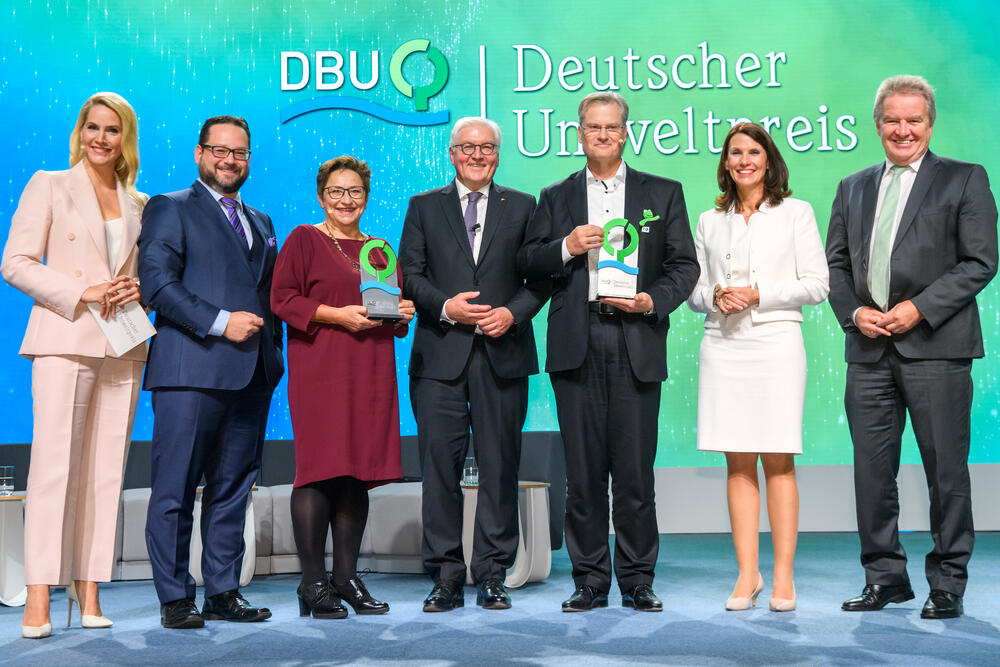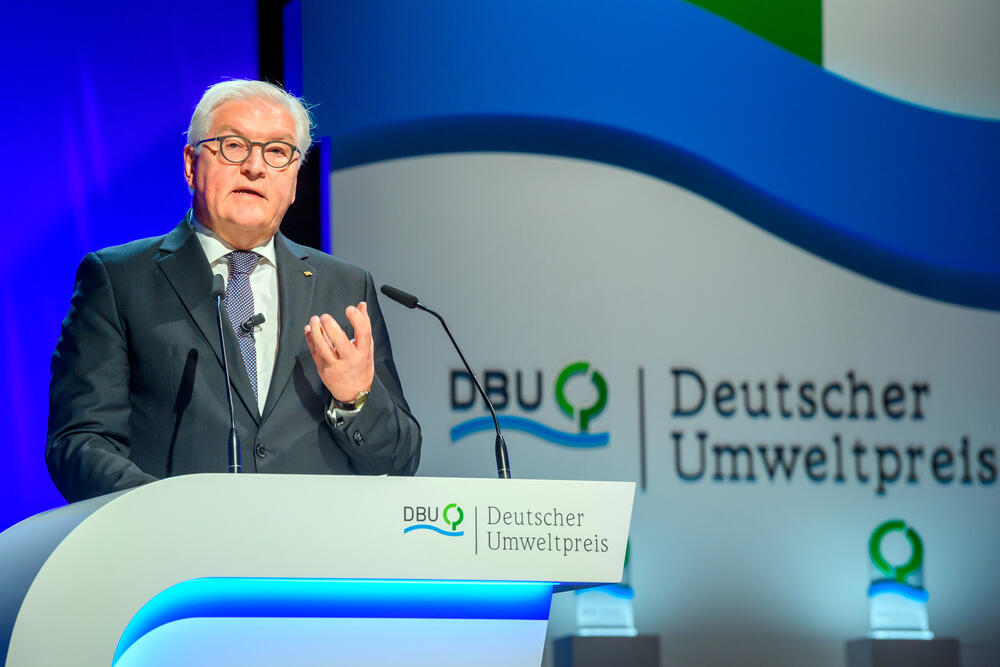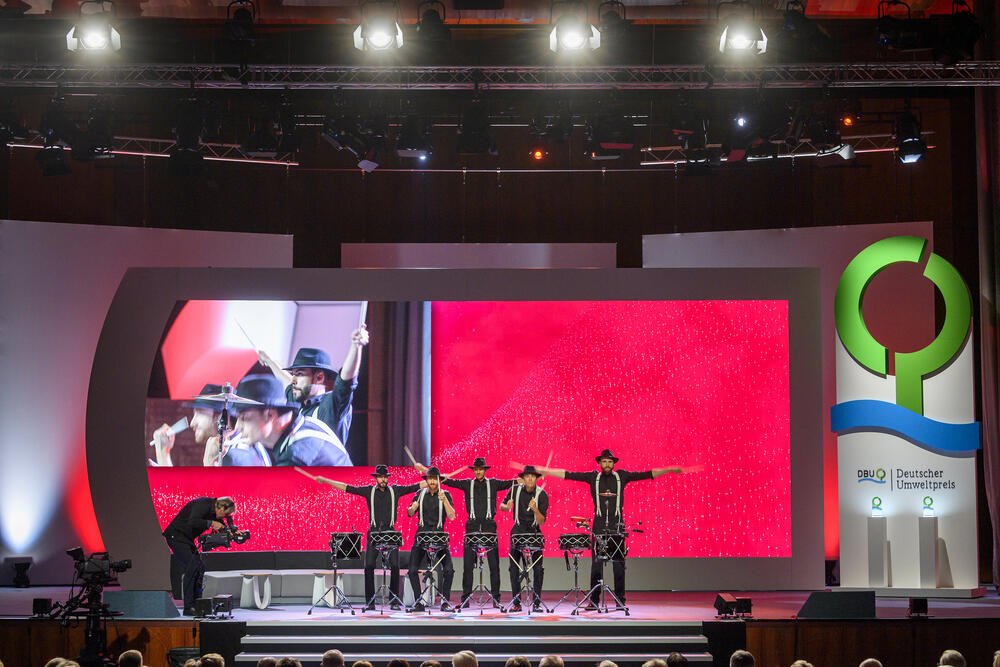DBU aktuell No. 9 | 2019 | English
Information on Grant Support Activities of the German Federal Environmental Foundation (Deutsche Bundesstiftung Umwelt)
1.) DBU Environmental Prize award ceremony in Mannheim – German President honours soil researcher and entrepreneur
Awarding the German Environmental Prize is one of the DBU’s most important tasks. The prize, which has a total remuneration of EUR 500,000, was awarded this year for the 27th time. The recipients were soil scientist Prof. Dr. Ingrid Kögel-Knabner and entrepreneur Reinhard Schneider. Kögel-Knabner, from the Technical University of Munich, Freising, researches topics that include the mechanisms that are involved in stabilising carbon dioxide in soil. With his comprehensive corporate sustainability strategy and high level of personal dedication, Reinhard Schneider, owner and managing director of Werner & Mertz GmbH, Mainz, has paved the way for environmental standards to be established at an ever-higher standard across the cleaning products industry.
Steinmeier: “We need heroes to help save the environment.”
German President Frank-Walter Steinmeier, who presented the prizes at the awards ceremony in Mannheim, recognised the prize winners in his speech in front of around 1,200 attendees, including Franz Untersteller, Minister of the Environment, Climate and the Energy Sector of Baden-Württemberg: “This Environmental Prize celebrates pioneers and heroes. It honours those who inspire hope because they demonstrate solutions to our problems. Once again this year, the prize is going to two exceptional individuals.”
Prize winner Kögel-Knabner is a role model for future generations of researchers: “With her research on the formation and composition of the organic matter in soil, she has pushed the boundaries of established knowledge. In a way, her research is as down-to-earth as it is extraordinary.” Kögel-Knabner has helped us to see how soil usage fits into a much larger picture – the global climate and the “truly alarming changes” that it is currently undergoing. After all, climate change is not only caused by factories and power plants, but is also the result of how we use the soil, which is the planet’s largest carbon sink.
“We can accelerate or decelerate climate change depending on how we use the soil,” said Steinmeier. We are already observing droughts that go on for months, torrential rains and flooding, and highly destructive storms in the countries of the global south. Summertime heatwaves have also become more frequent in Europe. “Soil science can help people to adapt their agricultural methods to these extremes.” That is why Ingrid Kögel-Knabner’s research is so important.
Schneider, President Steinmeier continued, acted responsibly as a businessman long before any of his contemporaries took action. His pioneering efforts demonstrated that environmental consciousness and commercial objectives are not in conflict with one another, instead turning this into his recipe for success. He streamlined his products and production processes until they were “fully sustainable”.
“Our planet is under threat and you, Mr. Schneider, wanted to take do something about it – and you have. When more consumers are paying closer attention in our supermarkets, this in turn increases pressure on manufacturers to become more environmentally friendly. However, this does not mean that politicians no longer have to hold up their end of the bargain. It is the state’s responsibility to regulate these matters and to step in wherever the market is not or not sufficiently attending to issues of environmental and climate protection.” The state’s toolbox includes transparency, consumer protection through quality labels, prices that also reflect the true cost for the environment and – where necessary – bans.
“What conflicts of interest are we facing? What is the cost of our actions and what is the cost if we fail to act?” said Steinmeier, offering attendees food for thought. At the end of his speech, President Steinmeier called on German citizens to establish a “virtuous circle for the future” in terms of environmental and climate protection by “taking courageous decisions today.” “The future is not predetermined, and it is up to us to decide what we want it to be.”
Schneider: “Plastic could be one of the most environmentally friendly materials of our time if we can learn to use it correctly.”
In short films and in a discussion with the moderator Judith Rakers, the prize winners once again underscored their positions.
For example, Schneider said that companies need to shift their focus to sustainability and assume responsibility for offering consumers attractive products and services. “It’s important that companies work during the development phase to ensure that that products can be recycled; for example, that they don’t involve different kinds of plastic that can no longer be separated.” In theory, plastic could be nearly completely recycled with almost no loss and using an extremely low-energy process, which would essentially result in zero waste.
Kögel-Knabner: “Our understanding of the role that soil plays in climate and environmental protection has improved dramatically; however, it has not yet reached the general public.”
Kögel-Knabner said that soil has many functions to perform. “It needs to trap carbon dioxide in order to fight climate change. However, soil also needs to be fertile because we also need to feed the growing global population. A handful of soil contains more organisms than there are people on the planet. This means that we have a great deal of biodiversity here that we want to protect,” according to the geo-ecologist.
Bonde: “We hope that you will get involved – we are always looking for innovators.”
At the end of the awards ceremony, DBU General Secretary Alexander Bonde invited everyone present to continue to work together on innovations and solutions for our ecological challenges.
Schlagzeugmafia from Mannheim provided the musical accompaniment for the ceremony.




